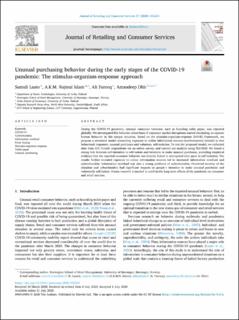| dc.contributor.author | Laato, Samuli | |
| dc.contributor.author | Islam, A. K. M. Najmul | |
| dc.contributor.author | Farooq, Ali | |
| dc.contributor.author | Dhir, Amandeep | |
| dc.date.accessioned | 2021-02-15T09:45:57Z | |
| dc.date.available | 2021-02-15T09:45:57Z | |
| dc.date.created | 2020-11-19T11:47:54Z | |
| dc.date.issued | 2020-07 | |
| dc.identifier.citation | Laato, S., Islam, A.K.M.M.N., Farooq, A. et al. (2020) Unusual purchasing behavior during the early stages of the COVID-19 pandemic: The stimulus-organism-response approach Journal of Retailing and Consumer Services, 57, 102224. | en_US |
| dc.identifier.issn | 0969-6989 | |
| dc.identifier.uri | https://hdl.handle.net/11250/2727992 | |
| dc.description.abstract | During the COVID-19 pandemic, unusual consumer behavior, such as hoarding toilet paper, was reported globally. We investigated this behavior when fears of consumer market disruptions started circulating, to capture human behavior in this unique situation. Based on the stimulus-organism-response (S-O-R) framework, we propose a structural model connecting exposure to online information sources (environmental stimuli) to two behavioral responses: unusual purchases and voluntary self-isolation. To test the proposed model, we collected data from 211 Finnish respondents via an online survey, and carried out analysis using PLS-SEM. We found a strong link between self-intention to self-isolate and intention to make unusual purchases, providing empirical evidence that the reported consumer behavior was directly linked to anticipated time spent in self-isolation. The results further revealed exposure to online information sources led to increased information overload and cyberchondria. Information overload was also a strong predictor of cyberchondria. Perceived severity of the situation and cyberchondria had significant impacts on people's intention to make unusual purchases and voluntarily self-isolate. Future research is needed to confirm the long-term effects of the pandemic on consumer and retail services. | en_US |
| dc.language.iso | eng | en_US |
| dc.publisher | Elsevier Ltd. | en_US |
| dc.rights | Navngivelse 4.0 Internasjonal | * |
| dc.rights.uri | http://creativecommons.org/licenses/by/4.0/deed.no | * |
| dc.subject | økonomi | en_US |
| dc.subject | pandemi | en_US |
| dc.subject | Covid-19 | en_US |
| dc.subject | handel | en_US |
| dc.title | Unusual purchasing behavior during the early stages of the COVID-19 pandemic: The stimulus-organism-response approach | en_US |
| dc.type | Journal article | en_US |
| dc.type | Peer reviewed | en_US |
| dc.description.version | publishedVersion | en_US |
| dc.rights.holder | © 2020 The Authors. | en_US |
| dc.subject.nsi | VDP::Social science: 200::Economics: 210 | en_US |
| dc.source.pagenumber | 12 | en_US |
| dc.source.volume | 57 | en_US |
| dc.source.journal | Journal of Retailing and Consumer Services | en_US |
| dc.identifier.doi | 10.1016/j.jretconser.2020.102224 | |
| dc.identifier.cristin | 1849775 | |
| dc.source.articlenumber | 102224 | en_US |
| cristin.ispublished | true | |
| cristin.fulltext | original | |
| cristin.qualitycode | 1 | |

